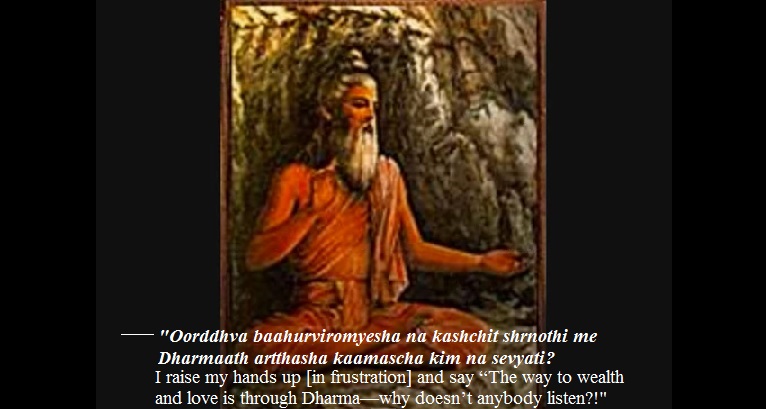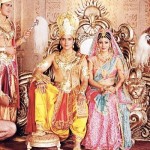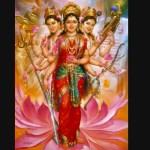In our previous article, we discussed how there is a global epidemic of characterlessness. And contrary to characterless gyaanis, waxing eloquent on the glories of their genius and genetically determined birthright to oppress others, it is character that qualifies one for leadership of any sort (political or spiritual). This is not because talent and ability, etc, don’t matter, but rather that one with character will have the commitment to work to overcome deficits in talent and ability (i.e. the tortoise and the hare).
Naysayers may argue saying “Ok, Nripathi, character benefits society, but what does it do for me?”. Therein lies the other problem—the characterless ask, “What have you done for me, lately”.
Character is what gives meaning to life. Without character, everything becomes a consumable, even romance, and romantic partners themselves become interchangeable. The current courtship climate in the so-called “advanced economy”/”developed world” is more akin to musical chairs or Baskin Robbins. That is the reason why Sita & Rama are praised in our society, because neither viewed love and looks as a consumable. In an age where Kings (even his own father) had many wives, Rama only had 1, why? Character.
It is not that other kings did not have character, it is that Rama’s character was the highest. To him, the pleasures of life (even married life) only had meaning through Sita and sharing them with her—rather than successive or replacement trophy wives. This is because character fundamentally means that who becomes more important than what or how much. YOLO and “Live for Today” are constructs designed to specifically subvert this, because a mania is created causing individuals to rush to gain an experience now…before it’s too late! But this isn’t character, it is consumption, it is vampirism. “If I cannot extract this life experience out of you, I shall extract it from someone else”. This exploitative outlook, in both communists and capitalists, is what defines the current line of characterless economic thinking.

Character is also the counter to circumstance. In life, those who live long enough, realise that their own success is not directly proportional (r^2=1/-1) to their own efforts, talents, or “IQ/Genetic superiority/Molecular perfection”. Circumstances have a critical influence. The historian Herodotus famously wrote “Circumstances rule men, men do not rule circumstances” after his survey of kings, queens, and commoners across civilizations. But if circumstances are so influential to the course of our lives, some ask why bother; why not just go with the flow and accept them via “eat, drink, and be merry”? Circumstances may indeed determine outcomes, but we have the power to determine our response to circumstances.

When Rama’s circumstances became unfortunate, did Sita start considering other kings or did she remain loyal to him? Did not Ravana try this line of reasoning? After all, contrary to most recent popular portrayals, Ravana himself had looks, lineage, learning, and luxury (not to mention power)—all qualities most women consider, so much so, that many women voluntarily left their husbands to chase after Ravana (and they ended up as degraded objects of pleasure in his harem). Unlike the women of today, why did Sita not “consider her options”? –For the same reason Rama did not “move on” and remarry after she left the world—marriage is more than just about pleasure. Character itself ensures constancy, throughout the various vicissitudes of life.

Character is also what prevents abuse of power. As we see today, power comes in many forms, not just the traditional wealth and power, but knowledge/education, ritual, beauty, intelligence, and yes, even circumstance. Draupadi’s circumstance is the most moving. An empress of royal & religious birth, reduced to bondage and finally disguised servitude in a foreign court….all through no fault of her own.
That is why character is so important. No system, no matter how intelligently designed, can be free of tyranny if the people themselves are completely characterless. It is why Sarasvati initially leaves Ujjain—because the people themselves had become immoral. Lakshmi leaves due to corruption, and Parvati leaves due to criminality. Criminality can be found in all castes and communities of society—character, and a society that values character, is what counters this. But today, India is the society of “Neethulu koodu gudda pettavu” and “Esh karo yaar!”…who has time for character? Having urges is natural, but having standards (for yourself an others) is meaningful.
That is why, of all the qualities the eminently unromantic cynic Acharya Chanakya praised, the highest ( above all (above even birth)), was character in a potential spouse. It is character that matters most, that forges trust in each other (and in society), that gives meaning to our existence, and that defeats that universal feeling of “being alone” (perhaps that is the real reason why, despite temporary extreme highs, most hedonists are overwhelmed by the epidemic of loneliness today). If we only live for ourselves, rather than each other, then we truly are alone and without purpose.
Casteists ruin Varnashrama Dharma. This is because for them, caste is the only consideration, the only prism, the be-all-and-end-all of everything. Rather than looking after Desh Kalyan and Lok Kalyan, they say one thing and do another, as all tyrants do. But the greatest virtues are those which are useful to other people.
“all science no philosophy”.
It is character that gives us purpose, and a purpose to our actions, and meaning to any pleasure we feel, and a point (and counterpoint) to our existence. Pleasure for its own sake is exceedingly risky. It does not mean that those seeking pleasure are bad—seeking pleasure is a natural instinct. But the danger arises in that selfish purposeless pleasure (i.e. pleasure as lifestyle—hedonism—or irresponsible pleasure with abandon or cruelty) may lead to gradual, and often undetected changes in our own character.
Sa yathaakaamo bhavati, tat kratur bhavati, yat kratur bhavati, tat karma kurute, yat karma kurute, tat abhisampadyate.[2, 272]
The best known paraphrase is as follows:
As your desire, so your will. As your will, so your deed. As your deed, so your character. As your character, so your destiny.
The harmless fun of a youthful indiscretion can lead to life-altering choices. And even those of excellent character can make a mistake. But if we continue to engage in wrong action, then it becomes not only our character, but soon our destiny.
The Flip-side
https://youtu.be/p1WWVZYmhVE?t=25m33s
There are many of course who naturally object that character itself is not objective as it can be faked. After all, Ravana pretended to be an Ascetic, Kalnemi came in the guise of the Rishi, and [Insert here] in the guise of a “Modern Acharya” (to fool all the scientism fanatics). But that is why character is revealed (by circumstance and adversity). Individuals may do all the right things, and say all the right slokas, and even “perform all the right rituals”, but we subconsciously detect something off of about that person, and avoid anointing them “AchArya”. By waiting and watching, we observe their true nature, which incidentally, reveals itself at the right moment, when the Lakshmana Rekha is crossed, or the handler instructs.
Others of course protest that politics is not for goody-two-shoes, and “we cannot be Satya Harishchandra”. No argument there. Yuga Dharma adapts Sanaathana Dharma to Time, Place, and Circumstance (Yudhisthira found that out the hard way over a game of dice). The Perfect Dharma of the Satya Yuga, drops to the imperfect but Rigid Dharma of the Treta, to the Nuanced Dharma of the Dvapara, to the near-imperceptibly subtle Dharma of the Kali. It is also why Dharma, especially Rajdharma, is necessarily balanced by Niti. Do your duty…but don’t be a dummy.
'Vasudhaiva Kutumbakam' does not imply blind adherence to a 'unilateral disarmanent'. Subversives are booted out of the family. pic.twitter.com/zJUdYzyyAg
— Shivoham (@Ganitamrita) December 5, 2016
Even if personal sentiment, courtesy, or even Rna dictate one thing, Dharma determines another, and we must follow it, not for nationalism, not for ritualism, not even for traditionalism, but for our own personal character, which is rooted in Truth. It is Satya (Truth) which gives tradition, ritual, and even the nation their purpose.

That is why no matter how great a personality may seem, no matter how much knowledge or what-have-you they have to share, if something (or someone) seems too perfect, it probably is.
https://youtu.be/LucCpOAIoww?t=202
Character is also why renunciation is considered virtuous. This is because if we are willing to renounce something (if necessary), then we are not beholden to it, we are not enslaved by it. That is why hedonists are pitied as slaves to their senses—just look at a drug addict; what is he/she willing to do in order to get his/her next high? Is it any different than some relationships some “girlfriends” and “boyfriends” and even wives and husbands have today? “Give me this/Do that, or I’ll find it somewhere else, from someone else”. That is also why in our tradition we say:
Na jithendhriyaanaam vishayabhayam | 262
Those who have control over their senses are not afraid of their indulgence in sensual delights. [1, 160]
Those who have conquered their senses do not fear sensual indulgence [because they can renounce it any time—especially if it risks becoming dangerous to anyone or disgraceful]
Pleasure comes in many forms, the most obvious being marital. But even pleasure in our other relationships in society (be it with our friends and relatives or…AchAryas). The pleasure of being associated with a group can often countermand obvious higher duties to society. That is why not only the guru-moha of Arjuna to Drona, but also the bandhu-moha (the attachment to relatives) of Lakshmana to Rama also had to be renounced. His separation from Rama before the end of his life was necessary in order to show that despite his fierce loyalty to Rama, he would never let that interfere with his own personal commitment to Dharma. In contrast, we all know what Dushasana was prepared to do out of his loyalty to his brother Duryodhana.
https://youtu.be/Bs2tJEphb-s?t=19m53s
That is why Prema is not Moha. That is why Dharma is so important—because Dharma is the path to perfect character. Rather than quantity of life, it is quality of life, quality of character, that matters. When character is perfect, not only the individual life, but existence itself has meaning, and we choose to continue to exist, not for ourselves, but for others…
In contrast, we have individuals reducing Dharma to only ritual. Ritual has its place, ritualism does not. This ritualism has in fact made man insensitive and even foolish. Like the hedonist who seeks the series of steps that will grant him physical gratification, the fruitive man ever believes in that series of steps to fruitive rewards—hence their perversion of Vedic Truth.
A person who uses Vedas for temporary advantages is like an animal, says the Upanishad.#Periyava
— Sage of Kanchi (@haraharasankara) September 2, 2016
The subconscious assumption that in any given context of life, almost algorithmically, if we perform x,y,z ritual, we gain the result (“I have completed my task, so I deserve the reward. I have done my job so I deserve my salary”) has made men characterless. Ritual certainly has its value to Dharma, as do the Yagnas that are prescribed in Karmakanda, but it is not the be all and end all as the overcompensating publicly “hypermasculine” (but privately effeminate) charlatans declare. Ritual serves as a guide and as a regimen for men and women, but it is for a higher purpose. Just as the artist trains to create beauty and the aaesthete trains to appreciate it, the seeker of wisdom trains in ritual, and higher than that, tapasya, to improve character. Hence the traditional phrase: character-building.
We need people who will be living embodiment of nobility of Hindu religious beliefs. It is by them that Hinduism will continue to thrive.
— Sage of Kanchi (@haraharasankara) August 7, 2016
But where is the importance of character building today? We want instant results, instant gratification, and seek knowledge only as the algorithm to attain them, rather than to appreciate the results or pleasure or beauty in all their layers. My Right (with pleasure as the aim) vs My Duty (with pleasure as a possible pleasant byproduct. Nishkaamya karma). No wonder women (and now men) are being objectified—it is not their duty to each other that matters, but how they have become objects from which to extract x,y, z, experience or pleasure or aim. No wonder relationship partners and even life partners are so replaceable today (given the epidemic of serial monogamy and polyamory), it is not the person (and her/his uniqueness that matters to us) but the experience or pleasure or objective that can be extracted…or given away.
https://youtu.be/zaWaNoFeRtQ?t=4m28s
Ritual & Tapas helps us build character, circumstances test character, but Dharma is the compass for character. The essence of Dharma is not ritual. The essence of Dharma is Rta (moral order/harmony) which is the expression of Satya (Truth). That is the true purpose of religion (not robotic ritualism and fruitive reward from the Devas), but moral order and harmony in the universe, in the nation, and in the home. The spirit of Dharma is thus Rta and, above all, Satya. If Dharma is the compass, Rta is the Cardinal Direction, but Satya is the inner magnetism.
And that is the problem today. Ritualism has resulted in precisely the type of societal incompetence that continues to plague the “Modern” Hindu. This being the Kali Yuga, whatever the protestations and prevarications of the ritualist right, religion too has undergone corruption and all varnas too have been guilty of this. As Acharya Chanakya wrote, “A fish first rots from the head”. Ignore the charlatans, and seek what you know to be true in your heart: the Truth. That is the spirit of our age-old Dharma. It is not Rna-meva Jayate or Ritual-meva Jayate, but Satyameva Jayate—this is the spirit of our tradition, and shame on the selfish creatures who define it otherwise. Their agenda is known for all who see through their characterlessness.
Bhagavad Gita 2:42-43
yam imam puspitam vacam
pravadanty avipascitah
veda-vada-ratah partha
nanyad astiti vadinah
kamatmanah svarga-para
janma-karma-phala-pradam
kriya-visesa-bahulam
bhogaisvarya-gatim prati ||
Men of small knowledge are very much attached to the flowery words of the Vedas, which recommend various fruitive activities for elevation to heavenly planets, resultant good birth, power, and so forth. Being desirous of sense gratification and opulent life, they say that there is nothing more than this.
Aesthetics
What is beauty?—perfect nobility. What is ugliness?—imperfect character.
That is why real art about the outward expression of inward significance.
Even an ugly thought can be give attractive expression. It is only after we study the inner essence that we look beyond the makeup. It is why aesthetics is predicated upon the moral aesthetic of a society.
That is also why aesthetics cannot simply be translated as rasa, but is in fact rasalankara. The beautiful, ornamented expression of the flavours of life. Even the disgusting can be presented in aesthetically pleasing ways. Literalism is not the highest sophistication. Mere outward shows, even to the gods is not enough. It is pureness of heart, even with Bhakti.
Bhakti is important. But as with ritual, Bhakti can’t be the be all and end all for responsible citizens. Blaring Bhakti songs at 180 decibels does not substitute for having actual Godliness in your heart. Merely showing your Bhakti (or even feeling it while stomping over others at Temple) is not enough. Bhakti is not about being a whirling dervish whipping oneself into a public frenzy, and advertising it to all, but in feeling spiritual oneness with the Divine and having gratitude in your heart. Those who advertise their religiosity the most are usually the ones who feel sincerity the least.
https://youtu.be/umLUKBlpyoY?t=86
As with ritualists, so with the bhakti brigade. First a caveat: One should never dream of harassing either in their private dharmic endeavours…it is a matter between them and God. Bhakti, as with Knowledge, as with Ritual, is important, very important, and kudos to those who follow those margas. But the problem is when any of these become a substitute for character. That is the importance of Atma-vichara (introspection), and Viveka (distinguishment between right and wrong), and parinamavasya (willingness to change). The outwardly uber-religious donkey who justifies his ill-bred and even adharmic behaviour on account of his performance of ritual or bhakti kirthana is one who has completely missed the message to begin with. The path to perfection is not a one or two step move. It requires constant introspection of whether or not you are not only fulfilling individual duties, but general duties to society as well. But Bhakti has become a convenient excuse for individuals to forego any introspection let alone concrete accountability for civic negligence. “I work job, raise family, do puja…I am not responsible for anything else…who are you to tell me…I go to temple!”
When individuals so stubbornly dig in, constantly criticising or expecting change from others rather than asking whether they themselves might be in the wrong…this too is another type of characterlessness. That is why, time and again, we have said that the most valuable virtues are those useful to other people. Going to temple is very good, but it cannot be a shield for bad and irresponsible behaviour—otherwise it is hypocrisy. Doing ritual is good, but if you use that as an excuse to justify misbehaviour or develop greed for power, then it too is hypocrisy. All these things exist to perfect ourselves—merely doing them does not mean we have already attained perfection…no matter what mummy says.
Some men think they are God’s gift to women, and many women think they have license to behave as if they themselves were gods. That is the danger of Ego—it divorces us from the onus, or even the basic responsibility, to ask whether we were in the wrong and need to either do better or correct ourselves. Introspection. But we live in a time when individuals can be proven wrong, without any facts on their side, and they will still stubbornly say “I stand by what I said”. Bear in mind, this brazening out is often not even a matter of Bhakti and Faith, but simply Ego on simple matters like history. By all means, keep doing whatever makes you feel closer to the Divine, but for the love of God, start taking responsibility for your own actions. All the patriarchy memes in the world won’t change the fact that a real man is one who takes responsibility for his own actions. That is what real character is and why it is so important.
Have you done everything that can be reasonably expected of you?
Have you done contributed anything tangible at all to the cause you hold dear?
If you can’t do much, have you given minimal support or more to those that are?
Have you even thought about these questions while you were stuffing your face with samosa?
That’s our problem, people who are all talk but no action. Content that they have fulfilled their spiritual responsibilities they feel no obligation for their civic responsibilities—but they whine in impotent profanity or wait for Kalki.
From Satya Harishchandra in the Satya Yuga to Yudhisthira in the Dvapara to general Krishna Niti in the Kali, Dharma too has had to adapt, in order to protect Satya, sometimes with asatya. Chhatrapati Shivaji has embodied this. Similarly, Anusuya, Lopamudra, Sita, Sati, Savitri remain the highest standards of not only personal character, but moral character, and should remain so. Shakespeare may have said “Frailty thy name is woman” in Hamlet, but our Civilization has proven otherwise through women of character who held fast to their Dharma, whatever their external delicacy or circumstantial difficulty.
But character is not only determined by youthful pasts, but the behavioural present. Along with sexual morality there is ethical integrity and commitment to the common Dharma, the Saamaanya Dharma. Along with the golden Pativrata is the silver Sahadharmacharini of Kunti, Draupadi, Ahalya, Tara, & Mandodari fame. Arguably there is even a bronze (or copper/tamra) standard for women who are culturally & civilizationally loyal, whatever their complications. Moral judgment and condemnation is easy, living and leading by example is hard. If you demand character in others, demonstrate it yourself. Otherwise, expect to receive what you yourself have lived (whether you know it or don’t). Those who live for Dharma include aspirers to Seeta-Rama, but they also include those who have lived Kunti-Pandu.
Character is 3 parts:
1.Moral Character (living according to Moral Standards, religious, sexual, etc)
2.Personal Integrity (holding true to your obligations, beliefs, and promises)
3.Ethical Civility (treating other with respect and acting for societal good)
For too long, we have only emphasised the top most and used that to excuse all-sorts of treacherous behavior (“well, he goes to temple and does all the rituals, etc”). The net result is youthful allergy to morality or any sort of sexual constraint or personal restraint, due to this hypocrisy. But a moral or sexually moral traitor is still a traitor. Rather than browbeating youth from the inside out, encourage them to live with character from the outside in. Let us start with basic ethical civility, then go to personal integrity, and then some semblance of Sexual morality. Educate and inculcate the highest standards, yes. Teach them Sita & Rama. But also show them the way back if they take unfortunate detours. Dignity is not brow-beating. Dignity is not severity. Dignity is self-respect. People will fail and fall, but at least they will rise again, and seek to live lives of character and dignity.

It is not simple about karma, but about kriya (doing). Actual doing. Actually doing something to improve something, some small aspect of the world, the nation, the state, the city, or even the community around you. Something![Ram Raj] was not built in a Day. The characterless have all the time in the world to criticise others and give gyaan about what others should be doing…but what are you actually doing, gyaani? Simply hiding behind past glories of your caste or ancestry does none of us any good. What you actually do today is how posterity will judge you tomorrow.
Character, after all, is not simply a matter of personal entry into svarga or praise from your parents or even personal success. It is a matter of national & civilizational survival.
References:
- Chaturvedi, B.K.Chanakya Neeti.Diamond: New Delhi.2015
- Radhakrishnan, Sarvepalli. The Principal Upanisads. London: Unwin Brothers. 1968










